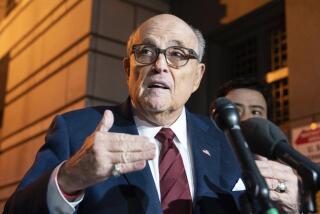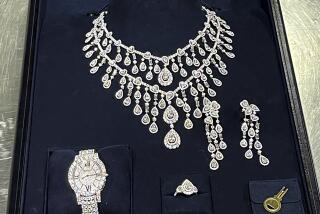Italy’s Colorful Leader Rides Out Controversies
- Share via
ROME — When Italian Prime Minister Silvio Berlusconi emerged from his bribery trial one recent day, a crowd awaited.
“You’ll end up like Ceausescu!” a heckler cried out, alluding to the reviled Romanian dictator who was summarily executed after a brief trial.
His famous temper flaring, Berlusconi demanded that his aides get the man’s name, and he promised to sue. Later, speaking on one of the many television stations he controls, Berlusconi said he was convinced that the protester was planted by communists out to get him.
He is a victim, he said, of a vast left-wing conspiracy aimed at toppling his government that involves, among others, several journalists and the judiciary that is prosecuting him -- “men in togas,” as he calls the judges, “a cancer to be eradicated.”
“Coup plotters,” he spewed.
There is no more colorful elected leader in Europe today -- and perhaps none more controversial -- than Silvio Berlusconi.
Where else in the Western world can a businessman amass great wealth, own major media companies, become leader of the nation, stand trial for corruption, have laws changed that he doesn’t like or that might touch on his business empire, and continue to rule unimpeded and with considerable national support?
In a land where governments can fall like seasonal leaves and the level of political discourse is the stuff of high theater, Berlusconi has shown a remarkable ability to survive and an unflinching tenacity to go after his critics.
The son of a bank clerk, Berlusconi, 66, is Italy’s richest man, one of the richest people on the continent, and Forbes magazine last year ranked him the third most powerful billionaire in the world.
Supporters say the media tycoon is exactly what Italy needs: a decisive strongman who can reshape the national economy and take the country into the future the way he would take an ailing corporation into profit.
Opponents fear that Berlusconi -- who controls not only the executive and legislative branches but also most electronic media, and having declared war on the judiciary -- is waging a dangerous campaign against Italy’s democratic institutions that will ultimately curtail essential civil liberties.
The prime minister sees things in the reverse. It is a leftist-dominated judiciary, he says, that is attempting to undermine Italian democracy by bringing down a man elected twice with comfortable majorities.
As proof of the conspiracy against him, he cites -- as he did during testimony at his trial last week -- a dizzying string of brushes with the law: 1,600 court hearings, 500 police raids, 150 bank inspections. Work, he says, for 125 lawyers.
“My [business] group and I suffered a veritable judicial persecution, which is unique in the history of all democracies,” Berlusconi said recently on the state TV news program, Excalibur.
Berlusconi’s troubles took on added urgency because Italy will assume the rotating six-month presidency of the European Union on July 1. The looming semester is an important one because the EU is expected to adopt its constitution.
Some in Europe were nervous about the Italian prime minister’s ability to lead effectively if dogged by a very public trial and found guilty.
The 1985 case alleged that Berlusconi, in cahoots with a leading pasta maker, bribed judges to influence the sale of a food conglomerate.
Berlusconi has denied any wrongdoing. But more conveniently, his center-right coalition last week pushed through an immunity law that freezes the trial as long as Berlusconi is in office. Immunity from prosecution -- abolished in 1993 as part of a judicial crusade against corruption -- was restored for the country’s top five officials.
Despite Italy’s long history of corrupt politicians, Berlusconi’s trial marked the first time that a sitting prime minister has had to testify as a criminal defendant.
*
‘Conflict of Interest’
Berlusconi and his family own Italy’s three main commercial television networks and, as prime minister, he has enormous influence over the three state channels. He also owns Italy’s largest publishing house, its dominant advertising agency and a food conglomerate, and is attempting to acquire the principal insurance corporation. And for added cachet, in addition to villas and yachts the world over, Berlusconi purchased the highly successful Milan soccer team.
Opponents cry “conflict of interest,” and many of Berlusconi’s supporters agree that, at the very least, the appearance of one exists, but they say it doesn’t matter. The arrangement may be comparable to Bill Gates becoming president of the United States, with an absolute majority in the House and Senate, having purchased ABC and CBS while continuing to run and profit from Microsoft.
“This doesn’t happen in Uzbekistan. It couldn’t happen in the former Soviet Union,” groused Francesco Rutelli, a former mayor of Rome who heads the center-left Olive Tree opposition coalition.
“He has a personal interest in everything the government decides on,” Rutelli said. “The government decides, Mr. Berlusconi makes money.”
Immaculately dressed and married to a former actress, Berlusconi is the consummate showman, with an operatic flair and an ego of uncompromising proportion. The London-based magazine the Economist called him a would-be Napoleon unfit to lead Europe (he’s suing them too). Even admirers describe him as a megalomaniac.
“By no means is he a saint,” said Berlusconi defender Giuliano Ferrara, editor of Il Foglio daily. “He’s an entrepreneur in a country ... where to [evade] the law was a national sport.”
But, says Ferrara, Berlusconi has proven himself after nearly a decade in politics and deserves to fill out his term, which will end in 2006.
Berlusconi sees himself as nothing short of the savior of Italy, the one man sufficiently admired to be able to rescue the troubled nation from the grips of communism.
“I was forced to intervene in public life, and leave behind a job that I enjoyed very much and which I believe I did well, to do something which is out of my sphere and which today is still a cause of total anguish for me,” he told Excalibur, “not because it is something I like, but because it is something I had to do.”
He may well be shepherding Italy’s most stable government in decades, even though he has still not been able to deliver on his promises of economic gains for all.
Berlusconi further alarmed EU members by traveling to Israel this month -- “on behalf of President Bush,” in his words, but which Washington says is something of an exaggeration -- and contravening EU policy by refusing to meet with Palestinian Authority leader Yasser Arafat. EU leaders continue to recognize Arafat as the leader of the Palestinian people, saying that neither Washington nor Israel can be allowed to sideline him.
And against an overwhelming tide of public opinion in Italy and much of Europe, Berlusconi enthusiastically supported the Bush administration’s war in Iraq.
Wildly successful in his financial pursuits, Berlusconi decided to run for public office after the 1993 anti-corruption crusades ended the careers of a generation of politicians. Outspoken and charismatic, he portrayed himself as an outsider and played on Italian fatigue with the country’s musical-chair ruling class.
*
Disparate Coalition
His right-wing coalition won elections in 1994 (but the government collapsed seven months later) and again in 2001, giving his loyalists easy majorities in both upper and lower houses of Parliament.
Berlusconi has managed to hold together his disparate but powerful coalition through a mix of acumen, money and mutual interest, supporters say. In addition to his own Forza Italia (Go, Italy) party, the coalition includes the neofascist National Alliance, whose leader, Gianfranco Fini, craves the legitimacy that government offers, and the far-right Northern League, whose leader, Umberto Bossi, needs the platform of elected office to launch his own campaign for devolution of powers from Rome to Italy’s outer regions.
“He’s a seducer,” Ferrara said of Berlusconi, explaining the prime minister’s ability to keep members of the coalition together. “He has a lot of money. He’s kind to them, he listens to their problems, gives them dinners at his villas. He’s flamboyant, eccentric, friendly, wealthy.”
Ordinary Italians do not seem overly bothered by Berlusconi’s alleged improprieties.
Critics say this is due, in part, to an indifferent and disenchanted electorate that has grown suspicious of organized politics. They also blame what the left calls Berlusconi’s stranglehold on the media. Because he, or businessmen sympathetic to his position, controls most electronic and print media, alternative voices are not given a fair hearing, they contend.
“Any idea that the political contest is played on an equal playing field is an absolute illusion,” said Tana de Zulueta, a leftist senator who says opposition to Berlusconi is one of the reasons she entered politics.
“For eight years, people have heard the same message,” she said. “In the end, people’s perceptions change. What seems right is wrong. What is normal or acceptable changes.”
In a report early this year, the Council of Europe determined that the conflict of interest between Berlusconi’s public office and private holdings “is a threat to media pluralism and sets a poor example for young democracies.” It also criticized the firing from state TV of two popular current-affairs hosts who were seen as critical of the government.
And members of his Forza Italia party passed a measure in a parliamentary committee mandating three-year jail terms for journalists found guilty of libel. (Even Berlusconi thought that went too far, and the law is likely to be dropped).
In terms of holding on to power, Berlusconi had seemed virtually unassailable, at least until recent local elections. In two recent rounds of municipal and regional voting, the opposition scored significant victories.
The notoriously fragmented center-left opposition was delighted. But although the results stirred disputes within Berlusconi’s coalition, the prime minister dismissed the elections as irrelevant to the national picture.
“The gentlemen of the left,” he said, “will remain in the opposition for the rest of their lives.”
More to Read
Sign up for Essential California
The most important California stories and recommendations in your inbox every morning.
You may occasionally receive promotional content from the Los Angeles Times.














